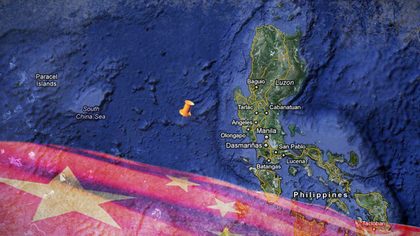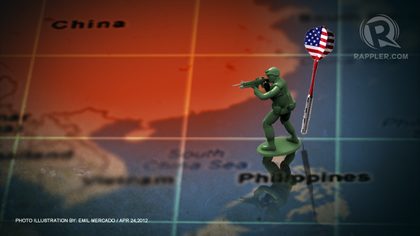SUMMARY
This is AI generated summarization, which may have errors. For context, always refer to the full article.

MANILA, Philippines – Organizers of anti-China protests Friday, May 11, said these will alert the world about China’s supposed arrogance in the Scarborough Shoal dispute, but other Filipinos said such moves will do the Philippines more harm than good.
Spearheaded by the overseas group US Pinoys for Good Governance, the protests were scheduled at noon outside Chinese embassies worldwide. In the Philippines, at least 400 of the expected 1,000 protesters attended the rally, based on police estimates.
Rappler moderated a social media conversation on this Thursday, May 10, and found respondents divided on the use of protests to assert the Philippines’ Scarborough Shoal claim. (See comments in the Storify link below)
China’s military, economy
Those against the protests, on one hand, said such actions will only exacerbate the tension between the two countries. They said China, for one, has a better-equipped military and a booming economy that can boost Philippine trade.
On Rappler’s Facebook page, Chinese studies expert Aristotle Dy described the protests as “ill-advised.”
“Emotional reactions will not get us anywhere, and we have everything to lose if things escalate. Confrontation has never been a successful strategy with China. Both sides are making competing claims that will remain inconclusive, so it seems best to pursue joint exploration instead,” Dy said.
Latest statistics show that in terms of personnel, China boasts of an army, air force, and navy that are 20, 20, and 10 times bigger than their Philippine counterparts.
China has said it is ready for the escalation of a drawn-out maritime standoff with the Philippines.
In terms of trade, China is now the Philippines’ number one trading partner in imports and exports, Trade Undersecretary Cristino Panlilio told reporters Wednesday, May 9.
It is also the Philippines’ 4th highest source of foreign tourists, based on the Department of Tourism’s 2011 data. Major Chinese travel agencies, however, have suspended travel tours to the Philippines due to the Scarborough Shoal standoff between the two countries.
The boycott’s impact is immediate but temporary, Tourism Undersecretary Ma Victoria Jasmin told Rappler.
What about patriotism?
Filipinos supporting the protests, on the other hand, appealed to a sense of country.
Some of them said Filipinos should not leave the dispute to the government, while others said a peaceful protest could wield international influence.
In a Twitter response to Rappler, the Black and White Movement’s Leah Navarro said the Department of Foreign Affairs “can handle (the) diplomatic side, but we must assert that Panatag is ours. We shouldn’t tolerate bullying.”
A key stumbling block for the Philippines in its negotiations with China, observers have noted, is its lack of an envoy to Beijing. President Benigno Aquino III has not appointed a new Philippine ambassador to China after his controversial first nominee, Domingo Lee, withdrew his nomination.
In the meantime, Aquino has said the Philippines’ “best weapon” against China is international attention.
The chair of US Pinoys for Good Governance, Loida Nicolas Lewis, shared the same view when she organized Friday’s global protests.
“The family of nations should see that this big wannabe world power, China, is not at all following international law. If you want to be a world power, you must be the first one to follow the rule of law of the international bodies,” the US-based Lewis said.
Chinese nationalism
Meanwhile, in China, the Scarborough Shoal standoff has ignited nationalist sentiment among the Chinese. The issue has, in fact, hogged headlines in Chinese state-run media since the issue erupted a month ago.
Complicating the issue is Chinese internal politics, with power players taking advantage of nationalistic feelings among the Chinese. The Chinese communist party is embroiled in a huge corruption scandal.
A Philippine senator himself has warned Filipinos about this.
“We must tread very carefully. China is currently embroiled in a leadership scandal at the highest levels of the Communist Party. The current tension in the West Philippine Sea could become a very convenient diversion by fanning the flames of nationalist fanaticism in China,” Sen Francis Pangilinan said.
For some experts, the key is to keep the United States out of the Philippines’ dispute with China.

Others, however, see the standoff as a proxy war between the China and the Philippines’ ally, the US.
A growing perception shows the South China Sea as the new Persian Gulf, said veteran China watcher Chito Sta Romana in a Thought Leaders piece for Rappler.
“(The) growing rivalry between China and the United States in Asia provides a strategic context that complicates the regional situation,” Sta Romana wrote. – Rappler.com
Click on the links below for more stories.
- China denies preparing for war over South China Sea
- Philippine banana impounded amid China sea spat
- China hits PH for ‘instigating’ citizens
- ‘Kung Fu’ dance: Protesting vs China the Pinoy way
- PH-China talks resume
Add a comment
How does this make you feel?
There are no comments yet. Add your comment to start the conversation.